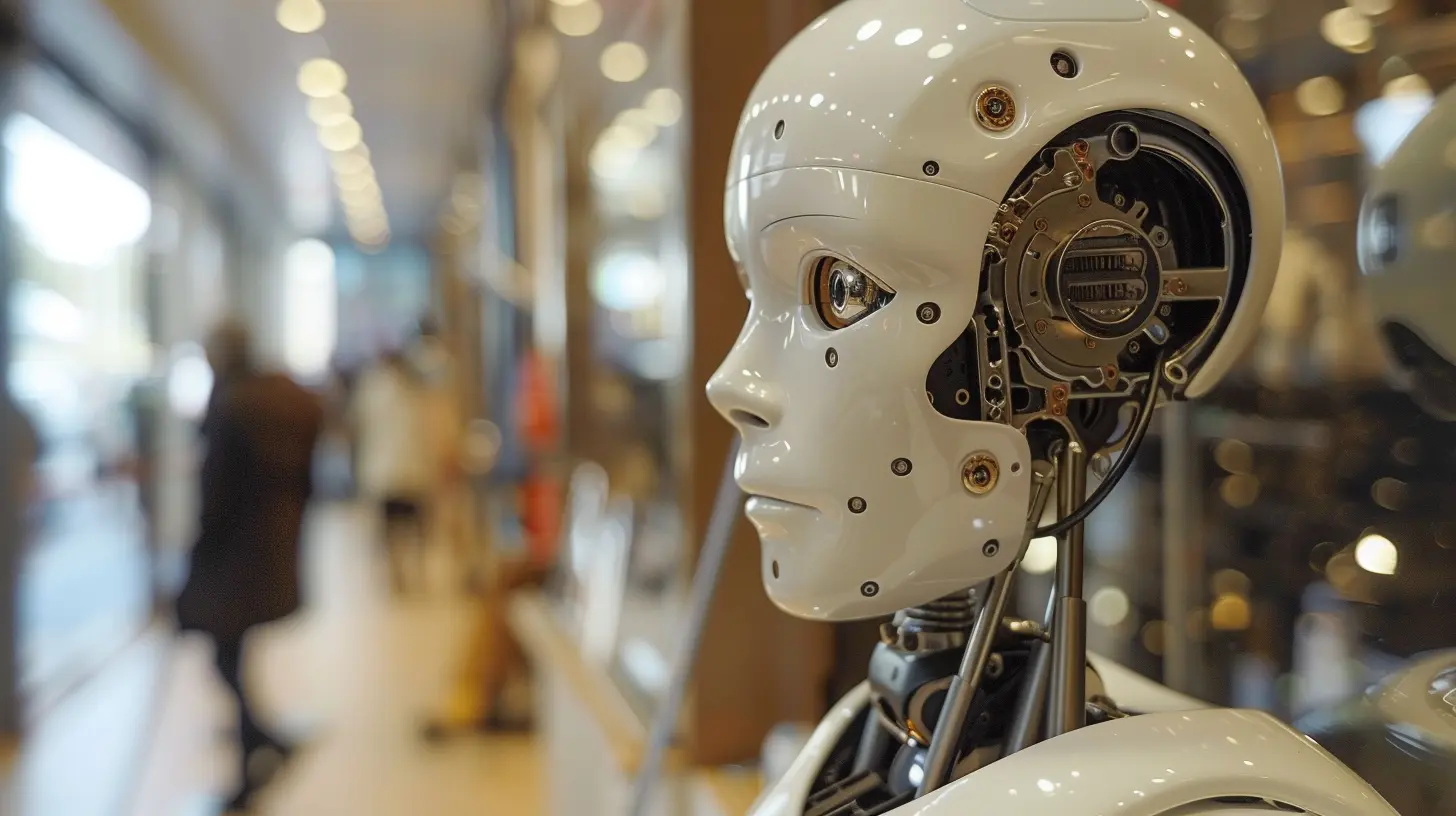The Ethics of Machine Learning: Navigating a Complex Landscape
16 December 2024
Machine learning (ML) has come a long way, and it’s no secret that it's transforming the way we live, work, and even think. From self-driving cars to voice assistants, machine learning is at the core of some of the most groundbreaking innovations today. But with great power comes great responsibility, right? As much as ML is shaking up industries, it’s also stirring up a whirlwind of ethical dilemmas.
So, what's the deal with the ethics of machine learning? How do we navigate this complex landscape where machines are making decisions that can have a real-world impact on people's lives? Grab a cup of coffee and let’s dive into this challenging, yet fascinating, topic.

What Exactly Is Machine Learning?
Before we get into the ethical concerns, let’s quickly cover what machine learning is. In simple terms, machine learning is a subset of artificial intelligence (AI) where computers use data to "learn" and make decisions without being explicitly programmed. Think of it like teaching a child to recognize a dog. Instead of telling the kid, "A dog has four legs, fur, and a wagging tail," you show them a bunch of pictures of different dogs, and over time, they figure it out on their own.Machine learning algorithms adapt and improve as they are exposed to more data, creating predictions or decisions that can be applied to a variety of fields, from healthcare to finance. But as exciting as this sounds, it’s also where things start to get murky.

The Ethical Dilemmas in Machine Learning
Let's be real: machine learning can be a double-edged sword. On one hand, it has the potential to do a lot of good. On the other, it poses some serious ethical challenges. Below are some of the key ethical issues that we need to consider when dealing with machine learning:1. Bias and Fairness
Bias in machine learning is probably the most talked-about ethical issue. Simply put, machine learning systems are only as good as the data they are trained on. If the data is biased, the algorithm will be biased too. For example, if a facial recognition system is trained primarily on images of light-skinned individuals, it may struggle to accurately identify people with darker skin tones. That’s not just a technical hiccup; it can have real-world consequences, like wrongful arrests or exclusion from services.Why does this happen? Well, data often reflects the biases that already exist in society. If your training data is skewed because of historical or systemic biases, your machine learning model inherits those same biases. It’s like teaching a student from outdated textbooks—they'll learn, sure—but they’ll learn the wrong thing.
The Takeaway:
We need to ensure that the data we use is diverse and representative. More importantly, we need to continually audit these systems to prevent biased outcomes.2. Transparency
Machine learning models, especially deep learning ones, can be incredibly complex. Sometimes, they’re so complex that even the engineers who designed them don’t fully understand how they make decisions. This is often referred to as the "black box" problem. If we don’t know how a model arrives at a conclusion, how can we trust its output? Imagine being denied a loan, and when you ask why, the bank replies, "Well, the algorithm said so." That’s not exactly comforting, is it?The Takeaway:
For machine learning to be ethical, it needs to be more transparent. We should understand how decisions are made, especially when they affect people’s lives in significant ways.3. Privacy Concerns
Privacy is another hot-button issue when it comes to machine learning. Many of these systems rely on massive amounts of personal data to function effectively. For instance, your smartphone’s predictive text feature? It’s learning from everything you type. While this can improve user experience, it also raises questions about how much of our personal data is being collected, and what happens to it afterward. Who owns the data? How is it being used? And can we opt out?The potential for misuse of personal data is enormous. In a world where data is often described as "the new oil," there’s a lot at stake. Companies might use your data for things you didn’t consent to, like targeted advertising or even selling it to third parties.
The Takeaway:
We need stricter regulations and transparency around how personal data is collected, stored, and used in machine learning systems. Consent should be explicit, not buried in fine print.4. Autonomy and Control
Autonomy is a tricky issue when it comes to machine learning. When machines start making decisions for us, where do we draw the line? For example, consider self-driving cars. In theory, they can reduce accidents caused by human error, but they also bring up questions about control. If a self-driving car gets into an accident, who’s at fault—the passenger or the manufacturer? And what about decisions that affect life or death, like prioritizing one life over another in a car accident scenario?As machine learning becomes more integrated into everyday life, we risk losing control over decisions that were once exclusively human. It’s a little unsettling when you think about it, right?
The Takeaway:
We need to set clear guidelines on how much autonomy we’re willing to give machines, especially in situations that involve human welfare and safety.5. Job Displacement
Let’s not ignore the elephant in the room: machine learning is also raising concerns about job displacement. As machines become more capable, many fear they will replace human workers. We’re already seeing this in industries like manufacturing, retail, and even healthcare, where machines can perform tasks more efficiently than humans.While automation can lead to economic growth, it also has the potential to widen the gap between the rich and the poor. Those who can adapt and acquire new skills may thrive, but others may find themselves left behind.
The Takeaway:
It’s crucial to have policies in place to support workers who are displaced by automation. Education and retraining programs can help bridge the gap, but we need to start planning now.
Can Machine Learning Be Ethical?
Now, you might be wondering, “Is it even possible for machine learning to be ethical?” The answer is yes—but it’s not easy. Ethical machine learning requires a collaborative effort between engineers, policymakers, businesses, and society as a whole. It’s not just about building better algorithms; it’s about creating systems that are fair, transparent, and accountable.1. Ethical Frameworks
One way to ensure ethical machine learning is by developing ethical frameworks that guide the design, development, and deployment of these systems. These frameworks should be based on core principles like fairness, transparency, and accountability. Moreover, they should be adaptable because, let’s face it, technology evolves faster than we can keep up with sometimes!2. Human Oversight
At the end of the day, machines are tools, and tools should be used responsibly. That’s why it’s crucial to have human oversight in any machine learning process. No machine learning model should operate in isolation, especially in sensitive areas like healthcare or criminal justice. Humans need to be involved in reviewing and validating the decisions made by algorithms.3. Regulations
Governments and regulatory bodies also play a critical role in shaping the ethical landscape of machine learning. Just as we have laws governing how businesses operate, we need regulations that ensure machine learning systems are deployed responsibly. This could involve everything from data privacy laws to guidelines on algorithmic transparency.
Conclusion: The Road Ahead
The ethics of machine learning is a complex and evolving field. As we continue to push the boundaries of what machines can do, we must also be vigilant about the ethical implications. The challenges are significant, but they’re not insurmountable. By fostering transparency, ensuring fairness, and maintaining human oversight, we can harness the power of machine learning in a way that benefits everyone.In the end, it’s not just about building smarter machines; it’s about building a smarter, more ethical society. And that, my friends, is a goal worth striving for.
all images in this post were generated using AI tools
Category:
Machine LearningAuthor:

Adeline Taylor
Discussion
rate this article
18 comments
Raegan Erickson
Exploring the ethics of machine learning is vital for shaping a responsible future in tech. By prioritizing transparency and fairness, we can harness innovation to create positive change. Together, let’s navigate this complex landscape and build a better tomorrow!
March 20, 2025 at 3:23 AM

Adeline Taylor
Thank you for your insightful comment! I completely agree that prioritizing transparency and fairness is essential for ensuring that machine learning benefits society as a whole. Together, we can foster a responsible tech future.
Tiffany Flores
This article offers invaluable insights into the ethical considerations surrounding machine learning. It effectively highlights the importance of transparency, bias mitigation, and accountability in AI systems, guiding developers and organizations towards responsible practices that foster trust and ensure fairness in technology deployment.
February 26, 2025 at 5:28 AM

Adeline Taylor
Thank you for your thoughtful feedback! I'm glad you found the article's insights on ethics in machine learning valuable.
Falkor Hodge
Ethics must evolve alongside technology for responsible innovation.
February 11, 2025 at 8:25 PM

Adeline Taylor
Absolutely! Evolving ethics is crucial to ensure that technological advancements in machine learning are implemented responsibly and equitably.
Solara McDaniel
Great insights! Ethics in tech is so crucial today. Thanks!
January 31, 2025 at 4:52 AM

Adeline Taylor
Thank you! I'm glad you found the insights valuable—ethics in tech is indeed vital for our future.
Kestrel McCool
This article beautifully highlights the importance of ethical considerations in machine learning. Navigating this complex landscape is crucial for a responsible and innovative tech future!
January 25, 2025 at 9:38 PM

Adeline Taylor
Thank you for your insightful comment! I'm glad you found the article highlights the crucial role of ethics in shaping a responsible tech future.
Beatrix Shaffer
This article highlights the critical ethical considerations in machine learning, emphasizing the need for transparency, fairness, and accountability. As technology evolves, it’s essential for developers and organizations to prioritize ethical frameworks to ensure that machine learning benefits society while minimizing bias and harm. Great insights!
January 17, 2025 at 12:04 PM

Adeline Taylor
Thank you for your insightful comment! I'm glad you found the discussion on ethical considerations in machine learning valuable. Prioritizing these principles is crucial for a positive impact on society.
Thornefield McWhorter
This article effectively highlights the ethical challenges in machine learning. It would be beneficial to include more case studies demonstrating real-world implications and solutions, which could enrich the discussion and provide practical insights for readers.
January 6, 2025 at 10:02 PM

Adeline Taylor
Thank you for your insightful feedback! I agree that incorporating case studies would enhance the discussion and provide practical insights. I'll consider this for future updates.
Micah Reese
In a world where algorithms pulse with the weight of our choices, the ethics of machine learning morphs into a labyrinthine dilemma. As we unravel the threads of code, are we merely shaping tools, or are we inadvertently coding our own moral compass? The answers linger, tantalizingly out of reach.
January 1, 2025 at 5:58 AM

Adeline Taylor
Thank you for the thought-provoking comment! It highlights the intricate relationship between our choices and the ethical implications of machine learning, reminding us that as we shape these tools, we also reflect and redefine our own values.
Mara Kelly
Machine learning ethics is crucial; responsible practices are essential for societal trust and safety.
December 25, 2024 at 8:00 PM

Adeline Taylor
Absolutely! Responsible practices in machine learning not only foster societal trust but also ensure the safety and fairness of these technologies as they evolve. Thank you for highlighting this important aspect!
Kane McNair
Navigating the ethics of machine learning is like herding cats—complex, occasionally messy, but ultimately essential for a harmonious tech ecosystem. Just remember: teaching machines right from wrong is still easier than teaching humans!
December 23, 2024 at 9:25 PM

Adeline Taylor
Thank you for your insightful analogy! Balancing ethics in machine learning is indeed a complex challenge, but it's crucial for fostering responsible innovation in technology.
Aubrey Estes
This article beautifully highlights the crucial balance between innovation and responsibility in machine learning. Thought-provoking insights that resonate deeply. Thank you!
December 21, 2024 at 5:57 AM

Adeline Taylor
Thank you for your thoughtful feedback! I'm glad you found the insights meaningful.
Veronica Sharp
This article effectively highlights the critical need for ethical considerations in machine learning development. Great insights!
December 20, 2024 at 1:56 PM

Adeline Taylor
Thank you for your thoughtful comment! I'm glad you found the insights valuable. Ethical considerations are indeed crucial in machine learning.
Amy McClain
As we stand on the brink of a technological revolution, let’s champion ethical machine learning that prioritizes transparency and inclusivity. By navigating this complex landscape with integrity and foresight, we can harness the power of AI to uplift society and drive positive change.
December 20, 2024 at 4:38 AM

Adeline Taylor
Thank you for your insightful comment! I completely agree that prioritizing transparency and inclusivity in AI is crucial for driving positive societal change.
Joel Diaz
Great article! It’s crucial to address the ethical implications of machine learning as we advance. Thank you for shedding light on this important topic!
December 19, 2024 at 7:36 PM

Adeline Taylor
Thank you! I'm glad you found the article insightful. Addressing ethical implications is indeed vital as we progress in this field.
Thalwen Lozano
This article highlights the crucial need for ethical frameworks in machine learning, emphasizing transparency, fairness, and accountability to guide responsible AI development and deployment.
December 19, 2024 at 12:53 PM

Adeline Taylor
Thank you for your insightful comment! I completely agree that ethical frameworks are essential for guiding responsible AI practices.
Nala Mendez
Ethical considerations in machine learning are crucial for responsible innovation and societal impact.
December 19, 2024 at 3:44 AM

Adeline Taylor
Thank you for highlighting the importance of ethical considerations. Responsible innovation is essential for ensuring that machine learning benefits society while mitigating potential harms.
Xylo McCabe
Navigating machine learning ethics requires transparency, fairness, and accountability to foster trust and innovation.
December 18, 2024 at 8:23 PM

Adeline Taylor
Thank you for your insightful comment! I completely agree—transparency, fairness, and accountability are essential for building trust and driving innovation in machine learning.
Darrow Wolf
This article highlights the crucial ethical challenges in machine learning, fostering important discussions about transparency, bias, and accountability that are essential for responsible innovation.
December 16, 2024 at 4:18 AM

Adeline Taylor
Thank you for your insightful comment! I'm glad you found the article's focus on transparency, bias, and accountability essential for fostering responsible innovation in machine learning.
MORE POSTS

How AI is Improving the Speed and Efficiency of Wearable Tech

How Bioelectronics is Merging Biology with Technology

Optimizing Your Gaming Laptop: Tips for Peak Performance

AI and Smart Clothing: Where Fashion Meets Technology

How 5G is Helping Shape the Future of Drone Technology

Maximizing Productivity with Wireless Keyboards: A Comprehensive Guide

How AI in Healthcare Gadgets is Saving Lives

How Big Data is Driving E-Commerce Innovation

The Evolution of Video Content Creation: Tools You Need to Know

The Future of Smart Watches: Health Beyond the Wrist

Integrating Digital Assistants with Wearable Technology